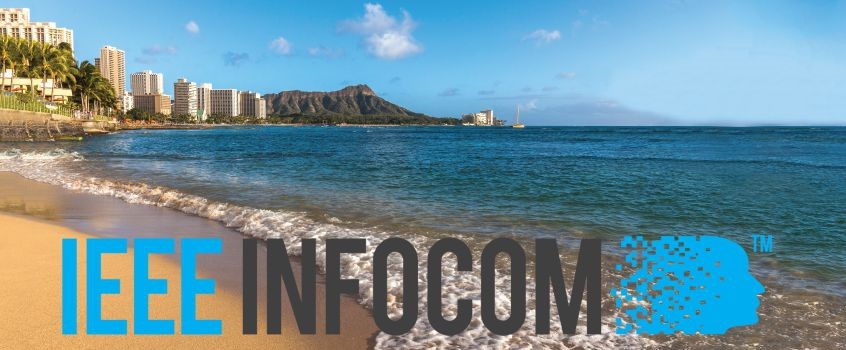
Publicado em: 26/04/2018
Doutorando se destaca com artigo no INFOCOM 2018
O doutorando do PPGC Roberto Costa Filho teve artigo aceito para publicação na mais prestigiada conferência internacional sobre redes de computadores.


O artigo “Scalable QoE-aware Path Selection in SDN-based Mobile Networks” do doutorando Roberto Costa Filho, com orientação do Prof. Luciano Gaspary, foi aceito para publicação no IEEE International Conference on Computer Communications (INFOCOM 2018). O evento aconteceu na semana passada, entre os dias 15/04 e 19/04 na cidade de Honolulu, nos Estados Unidos.
Junto com a ACM SIGCOMM, a INFOCOM é a mais prestigiada conferência internacional na área de redes de computadores e, raríssimas vezes, aceita trabalhos oriundos de instituições brasileiras. O evento reuniu uma série de workshops, painéis, apresentação de pôsteres e apresentação de artigos. Roberto apresentou o artigo na trilha principal da conferência, o que é motivo de orgulho para o Instituto de Informática.
Título: “Scalable QoE-aware Path Selection in SDN-based Mobile Networks”
Resumo: To deal with the massive traffic produced by video applications, mobile operators rely on offloading technologies such as Small Cells, Content Delivery Networks and, shortly, Cloud Edge and 5G Device to Device communications. Although these techniques are fundamental for improving network efficiency, they produce a multitude of paths onto which the user traffic can be forwarded. Thus, a critical problem arises about how to handle the increasing video traffic while managing the interplay between infrastructure optimization and the user’s Quality of Experience (QoE). Solving this problem is remarkably difficult, and recent investigations do not consider the large-scale context of mobile operator networks. To address this issue, in this paper we present a novel QoE-aware path deployment scheme for large-scale SDN-based mobile networks. The scheme relies on both a polynomial-time algorithm for composition of multiple QoS metrics and a QoS to QoE translation strategy. Considering real mobile operator topology and video traffic traces, we show that the proposed algorithm outperformed state-of-the-art approaches by reducing impaired videos in aggregate MOS by at least 37% and lowering the accumulated video stall length four times.

